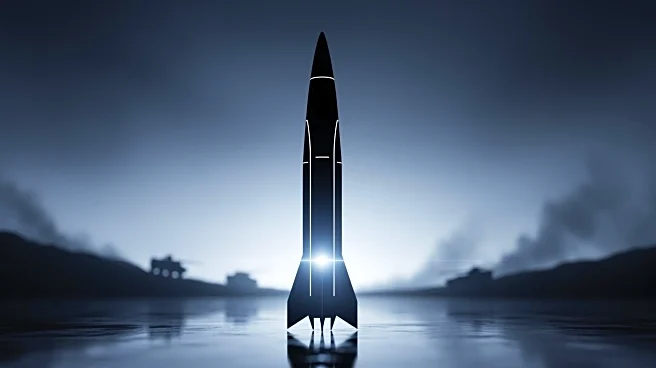What's Happening?
Russia has announced the successful test of a new nuclear-capable, nuclear-powered cruise missile, known as the Burevestnik. President Vladimir Putin revealed that the missile, which has been under development
for several years, is designed to evade existing defense systems. The missile reportedly covered 8,700 miles during a key test, operating on nuclear power for 15 hours. This development is part of Russia's broader nuclear strategy, which includes resisting Western pressure for a ceasefire in Ukraine and warning against the use of long-range Western weapons. The Burevestnik, also known as 'Skyfall' by NATO, has been shrouded in mystery, with concerns about its reliability and environmental impact. The missile's development follows a history of nuclear-powered missile projects that were abandoned during the Cold War due to safety concerns.
Why It's Important?
The testing of the Burevestnik missile signifies a significant advancement in Russia's military capabilities, potentially altering the strategic balance with NATO and the U.S. The missile's purported ability to evade missile defenses could challenge existing security frameworks and provoke a response from Western nations. This development comes amid heightened tensions due to the ongoing conflict in Ukraine, where Russia continues to conduct military operations. The introduction of such advanced weaponry could escalate the arms race and complicate diplomatic efforts to resolve the conflict. Additionally, the environmental and safety concerns associated with nuclear-powered missiles could have broader implications for global security and environmental policy.
What's Next?
The successful test of the Burevestnik may lead to further developments in Russia's military strategy, including the potential deployment of the missile. Western nations, particularly the U.S. and NATO allies, may need to reassess their defense strategies and consider diplomatic or military responses. The ongoing conflict in Ukraine is likely to remain a focal point, with potential implications for international relations and security policies. The introduction of this missile could also influence future arms control negotiations and discussions on nuclear non-proliferation.
Beyond the Headlines
The development of the Burevestnik raises ethical and environmental concerns, particularly regarding the use of nuclear power in missile technology. The potential for accidents and the environmental impact of such weapons could lead to increased scrutiny and calls for international regulations. The missile's capabilities may also prompt discussions on the future of missile defense systems and the need for technological advancements to counter new threats. The geopolitical implications of this development could extend beyond the immediate conflict in Ukraine, affecting global power dynamics and security alliances.








